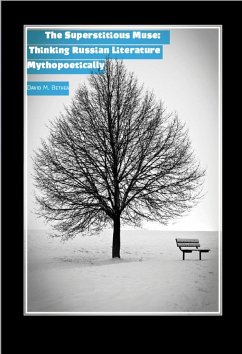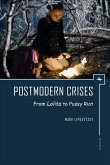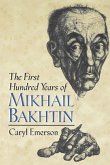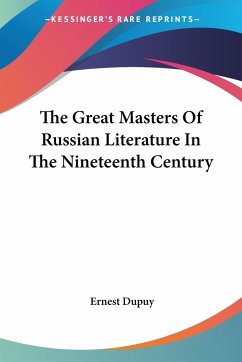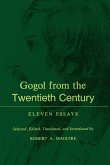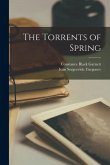- Broschiertes Buch
- Merkliste
- Auf die Merkliste
- Bewerten Bewerten
- Teilen
- Produkt teilen
- Produkterinnerung
- Produkterinnerung
For several decades David Bethea has written authoritatively on the ""mythopoetic thinking"" that lies at the heart of classical Russian literature, especially Russian poetry. This collection contains a liberal sampling of Bethea's most memorable previously published essays along with new studies prepared for this occasion.
Andere Kunden interessierten sich auch für
![Prosaics and Other Provocations Prosaics and Other Provocations]() Gary Saul MorsonProsaics and Other Provocations37,99 €
Gary Saul MorsonProsaics and Other Provocations37,99 €![Postmodern Crises Postmodern Crises]() Mark LipovetskyPostmodern Crises41,99 €
Mark LipovetskyPostmodern Crises41,99 €![The First Hundred Years of Mikhail Bakhtin The First Hundred Years of Mikhail Bakhtin]() Caryl EmersonThe First Hundred Years of Mikhail Bakhtin45,99 €
Caryl EmersonThe First Hundred Years of Mikhail Bakhtin45,99 €![The Great Masters Of Russian Literature In The Nineteenth Century The Great Masters Of Russian Literature In The Nineteenth Century]() Ernest DupuyThe Great Masters Of Russian Literature In The Nineteenth Century29,99 €
Ernest DupuyThe Great Masters Of Russian Literature In The Nineteenth Century29,99 €![Gogol From the Twentieth Century Gogol From the Twentieth Century]() Robert A. Maguire (ed.)Gogol From the Twentieth Century74,99 €
Robert A. Maguire (ed.)Gogol From the Twentieth Century74,99 €![The Torrents of Spring The Torrents of Spring]() Ivan Sergeevich TurgenevThe Torrents of Spring29,99 €
Ivan Sergeevich TurgenevThe Torrents of Spring29,99 €![The Trace of Judaism: Dostoevsky, Babel, Mandelstam, Levinas The Trace of Judaism: Dostoevsky, Babel, Mandelstam, Levinas]() Val VinokurThe Trace of Judaism: Dostoevsky, Babel, Mandelstam, Levinas27,99 €
Val VinokurThe Trace of Judaism: Dostoevsky, Babel, Mandelstam, Levinas27,99 €-
For several decades David Bethea has written authoritatively on the ""mythopoetic thinking"" that lies at the heart of classical Russian literature, especially Russian poetry. This collection contains a liberal sampling of Bethea's most memorable previously published essays along with new studies prepared for this occasion.
Hinweis: Dieser Artikel kann nur an eine deutsche Lieferadresse ausgeliefert werden.
Hinweis: Dieser Artikel kann nur an eine deutsche Lieferadresse ausgeliefert werden.
Produktdetails
- Produktdetails
- Verlag: Academic Studies Press
- Seitenzahl: 432
- Erscheinungstermin: 30. Mai 2018
- Englisch
- Abmessung: 234mm x 156mm x 22mm
- Gewicht: 603g
- ISBN-13: 9781618118127
- ISBN-10: 1618118129
- Artikelnr.: 52821241
- Herstellerkennzeichnung
- Libri GmbH
- Europaallee 1
- 36244 Bad Hersfeld
- gpsr@libri.de
- Verlag: Academic Studies Press
- Seitenzahl: 432
- Erscheinungstermin: 30. Mai 2018
- Englisch
- Abmessung: 234mm x 156mm x 22mm
- Gewicht: 603g
- ISBN-13: 9781618118127
- ISBN-10: 1618118129
- Artikelnr.: 52821241
- Herstellerkennzeichnung
- Libri GmbH
- Europaallee 1
- 36244 Bad Hersfeld
- gpsr@libri.de
David Bethea (Ph.D. University of Kansas, 1977) is a Vilas Professor of Slavic Languages, University of Wisconsin-Madison. Research interests include: Pushkin and his era, modern Russian poetry (esp. Khodasevich and Brodsky), Russian religious thought and cultural mythology, Russian émigré literature, Anglo-American vs. Russian modernism, 20th century Russian/Slavic literary theory (esp. influence studies), biography. Among his books are: Joseph Brodsky and the Creation of Exile (Princeton: Princeton University Press, 1994), and Realizing Metaphors: Alexander Pushkin and the Life of the Poet (Madison: University of Wisconsin Press, 1998).
Preface: David Bethea. Introduction: Caryl Emerson. Part One: Russian Literature: Background
Foreground
Creative Cognition. 1. The Mythopoetic "Vectors" of Russian Literature. 2. Mythopoesis Writ Large: The Apocalyptic Plot in Russian Literature. 3. Mythopoesis and Biography: Pushkin
Jakobson
and the Secret Life of Statues. 4. The Evolution of Evolution: Genes
Memes
Intelligent Design and Nabokov. 5. Relativity and Reality: Dante
Florensky
Lotman
and Metaphorical Time-Travel. 6. Whose Mind is this Anyway? Influence
Intertextuality
and the Legitimate Boundaries of Scholarship. Part 2: Pushkin the Poet
Pushkin the Thinker. 7. Of Pushkin and Pushkinists. 8. Biography (with Sergei Davydov). 9. Pushkin's Mythopoetic Consciousness: Apuleius
Psyche and Cupid
and the Theme of Metamorphosis in Eugene Onegin. 10. "A Higher Audacity": How to Read Pushkin's Dialogue with Shakespeare in The Stone Guest. 11. Stabat Pater: Revisiting the "Monumental" in Peter
Petersburg
and Pushkin. 12. Slavic Gift Giving
the Poet in History
and Pushkin's The Captain's Daughter. 13. Pushkin's The History of Pugachev: Where Fact Meets the Zero-Degree of Fiction. Part 3: Reading Russian Writers Reading Themselves and Others. 14. Sorrento Photographs: Khodasevich's Memory Speaks. 15. Nabokov's Style. 16. Sologub
Nabokov
and the Limits of Decadent Aesthetics. 17. Exile
Elegy
and Auden in Brodsky's "Verses on the Death of T.S. Eliot". 18. Joseph Brodsky and the American Seashore Poem: Lowell
Mandelstam
and Cape Cod. 19. Joseph Brodsky's "To My Dauther" (A Reading). 20. Brodsky
Frost and the Pygmalion Myth. Index.
Foreground
Creative Cognition. 1. The Mythopoetic "Vectors" of Russian Literature. 2. Mythopoesis Writ Large: The Apocalyptic Plot in Russian Literature. 3. Mythopoesis and Biography: Pushkin
Jakobson
and the Secret Life of Statues. 4. The Evolution of Evolution: Genes
Memes
Intelligent Design and Nabokov. 5. Relativity and Reality: Dante
Florensky
Lotman
and Metaphorical Time-Travel. 6. Whose Mind is this Anyway? Influence
Intertextuality
and the Legitimate Boundaries of Scholarship. Part 2: Pushkin the Poet
Pushkin the Thinker. 7. Of Pushkin and Pushkinists. 8. Biography (with Sergei Davydov). 9. Pushkin's Mythopoetic Consciousness: Apuleius
Psyche and Cupid
and the Theme of Metamorphosis in Eugene Onegin. 10. "A Higher Audacity": How to Read Pushkin's Dialogue with Shakespeare in The Stone Guest. 11. Stabat Pater: Revisiting the "Monumental" in Peter
Petersburg
and Pushkin. 12. Slavic Gift Giving
the Poet in History
and Pushkin's The Captain's Daughter. 13. Pushkin's The History of Pugachev: Where Fact Meets the Zero-Degree of Fiction. Part 3: Reading Russian Writers Reading Themselves and Others. 14. Sorrento Photographs: Khodasevich's Memory Speaks. 15. Nabokov's Style. 16. Sologub
Nabokov
and the Limits of Decadent Aesthetics. 17. Exile
Elegy
and Auden in Brodsky's "Verses on the Death of T.S. Eliot". 18. Joseph Brodsky and the American Seashore Poem: Lowell
Mandelstam
and Cape Cod. 19. Joseph Brodsky's "To My Dauther" (A Reading). 20. Brodsky
Frost and the Pygmalion Myth. Index.
Preface: David Bethea. Introduction: Caryl Emerson. Part One: Russian Literature: Background
Foreground
Creative Cognition. 1. The Mythopoetic "Vectors" of Russian Literature. 2. Mythopoesis Writ Large: The Apocalyptic Plot in Russian Literature. 3. Mythopoesis and Biography: Pushkin
Jakobson
and the Secret Life of Statues. 4. The Evolution of Evolution: Genes
Memes
Intelligent Design and Nabokov. 5. Relativity and Reality: Dante
Florensky
Lotman
and Metaphorical Time-Travel. 6. Whose Mind is this Anyway? Influence
Intertextuality
and the Legitimate Boundaries of Scholarship. Part 2: Pushkin the Poet
Pushkin the Thinker. 7. Of Pushkin and Pushkinists. 8. Biography (with Sergei Davydov). 9. Pushkin's Mythopoetic Consciousness: Apuleius
Psyche and Cupid
and the Theme of Metamorphosis in Eugene Onegin. 10. "A Higher Audacity": How to Read Pushkin's Dialogue with Shakespeare in The Stone Guest. 11. Stabat Pater: Revisiting the "Monumental" in Peter
Petersburg
and Pushkin. 12. Slavic Gift Giving
the Poet in History
and Pushkin's The Captain's Daughter. 13. Pushkin's The History of Pugachev: Where Fact Meets the Zero-Degree of Fiction. Part 3: Reading Russian Writers Reading Themselves and Others. 14. Sorrento Photographs: Khodasevich's Memory Speaks. 15. Nabokov's Style. 16. Sologub
Nabokov
and the Limits of Decadent Aesthetics. 17. Exile
Elegy
and Auden in Brodsky's "Verses on the Death of T.S. Eliot". 18. Joseph Brodsky and the American Seashore Poem: Lowell
Mandelstam
and Cape Cod. 19. Joseph Brodsky's "To My Dauther" (A Reading). 20. Brodsky
Frost and the Pygmalion Myth. Index.
Foreground
Creative Cognition. 1. The Mythopoetic "Vectors" of Russian Literature. 2. Mythopoesis Writ Large: The Apocalyptic Plot in Russian Literature. 3. Mythopoesis and Biography: Pushkin
Jakobson
and the Secret Life of Statues. 4. The Evolution of Evolution: Genes
Memes
Intelligent Design and Nabokov. 5. Relativity and Reality: Dante
Florensky
Lotman
and Metaphorical Time-Travel. 6. Whose Mind is this Anyway? Influence
Intertextuality
and the Legitimate Boundaries of Scholarship. Part 2: Pushkin the Poet
Pushkin the Thinker. 7. Of Pushkin and Pushkinists. 8. Biography (with Sergei Davydov). 9. Pushkin's Mythopoetic Consciousness: Apuleius
Psyche and Cupid
and the Theme of Metamorphosis in Eugene Onegin. 10. "A Higher Audacity": How to Read Pushkin's Dialogue with Shakespeare in The Stone Guest. 11. Stabat Pater: Revisiting the "Monumental" in Peter
Petersburg
and Pushkin. 12. Slavic Gift Giving
the Poet in History
and Pushkin's The Captain's Daughter. 13. Pushkin's The History of Pugachev: Where Fact Meets the Zero-Degree of Fiction. Part 3: Reading Russian Writers Reading Themselves and Others. 14. Sorrento Photographs: Khodasevich's Memory Speaks. 15. Nabokov's Style. 16. Sologub
Nabokov
and the Limits of Decadent Aesthetics. 17. Exile
Elegy
and Auden in Brodsky's "Verses on the Death of T.S. Eliot". 18. Joseph Brodsky and the American Seashore Poem: Lowell
Mandelstam
and Cape Cod. 19. Joseph Brodsky's "To My Dauther" (A Reading). 20. Brodsky
Frost and the Pygmalion Myth. Index.

